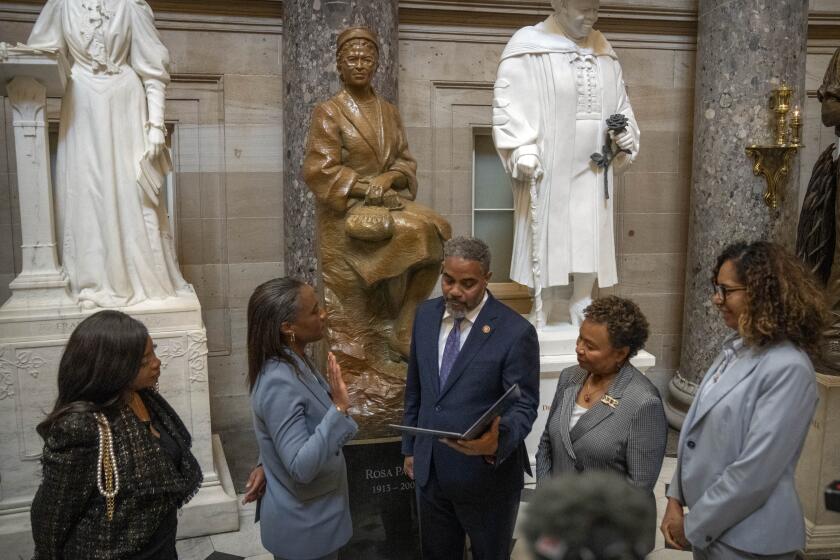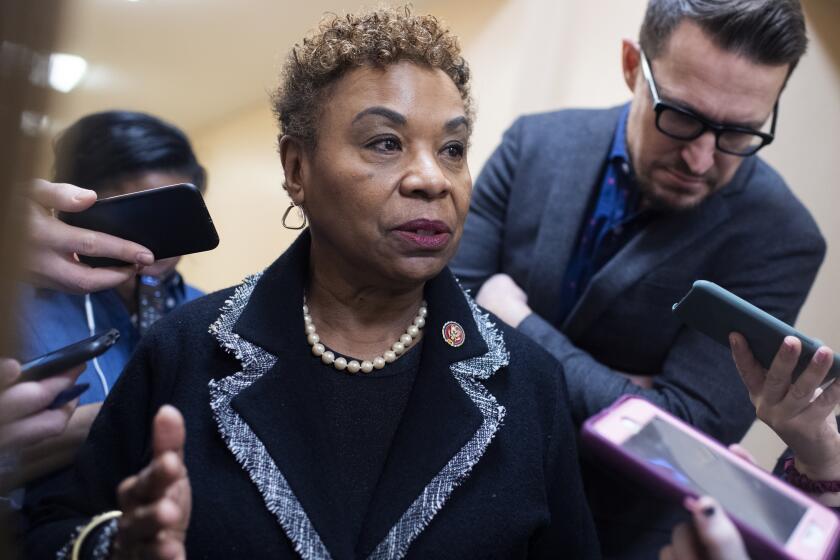California isn’t sending a Black woman to the Senate. But Barbara Lee won anyway
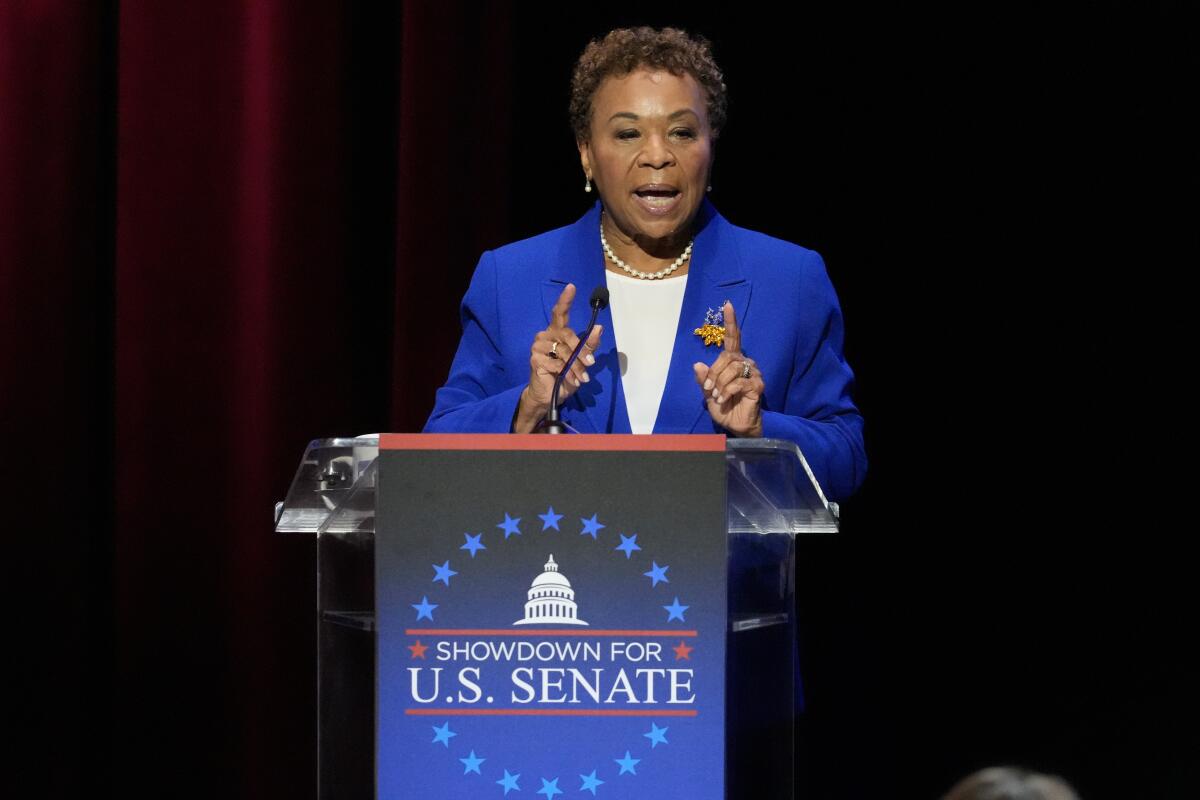
- Share via
I don’t know what I had expected from Barbara Lee when an aide handed her the phone, but the laughter I heard certainly wasn’t it.
Only a few hours had passed since the longtime congresswoman from Oakland had released a statement conceding the primary election for U.S. Senate and congratulating her Democratic colleague, Rep. Adam B. Schiff of Burbank.
Lee came in fourth place, more than a million votes behind Schiff and Republican Steve Garvey, and hundreds of thousands of votes behind Democratic Rep. Katie Porter of Irvine, who came in third. Ballots are still being counted, but the Senate race was called minutes after the polls closed on Super Tuesday.
Democratic Rep. Adam B. Schiff and Republican Steve Garvey advance to the general election in the contest to succeed the late Sen. Dianne Feinstein.
It was, by any stretch of the imagination, a crushing defeat.
Especially since Lee, and a committed sisterhood of politicians, activists, academics and lobbyists across California, had spent almost four years working behind the scenes to boost representation for Black women at the highest levels of the federal government.
Now Schiff and Garvey will face each other in the November general election — and Schiff will certainly win in this overwhelmingly Democratic state. He’ll be a senator for years to come.
So I wondered, why was Lee laughing?
“I’ve been persistent, and every step of the way there have been roadblocks and obstacles,” she told me, growing serious. “But again, this is such an example of a Black woman’s life.”
::
It’s worth reflecting on how we got here. At least, that’s what California Secretary of State Shirley Weber has been doing.
“The whole thing started with believing that African Americans deserve to have a seat,” she told me.
It was back in 2020, and Weber was serving in the state Assembly and as leader of the Legislative Black Caucus. Joe Biden had just been elected president, with no small amount of help from Black women, and Kamala Harris had just vacated her Senate seat to become the nation’s first Black and South Asian vice president.
Weber and a long list of Black politicians, activists, academics and lobbyists decided that Black women needed to continue to have representation in the upper chamber. That it would be a loss not having someone with such intersectional life experiences when the state and country are becoming more diverse with each passing year.
“The ability around the nation to recognize and to support Black women in statewide positions is very bleak,” Weber told me in 2020. “You got 100 people in the Senate and you don’t have one Black woman.”
The “Keep the Seat” campaign was born, and the words became a rallying cry. Supporters urged Gov. Gavin Newsom to do just that by picking Lee or then-Rep. Karen Bass, both eminently qualified longtime legislators, as a successor to Harris.
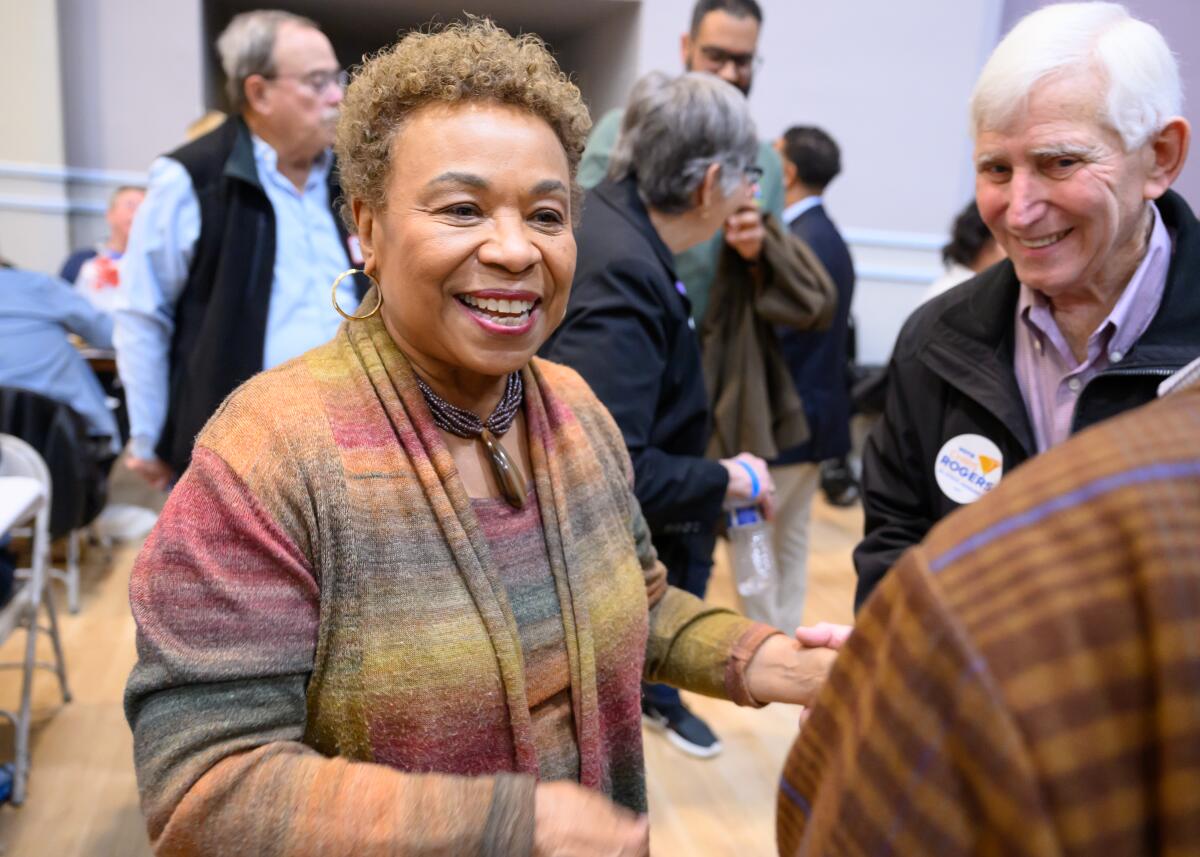
Newsom ended up selecting then-Secretary of State Alex Padilla instead, Lee stayed in Congress and Bass, of course, became mayor of Los Angeles. But the rallying cry didn’t go silent. Rather, it returned alongside calls for Sen. Dianne Feinstein to step down over concerns about her health, prompting Newsom to promise to appoint a Black woman to her seat if it came to that.
Then Feinstein died last year, setting off a days-long political mess, mostly of the governor’s own making. At issue was an apparent caveat in Newsom’s promise. He said he’d make an “interim appointment” because the campaign for the Senate seat had already been underway for months.
Lee and other Black women — myself included — took umbrage, wondering why were only good enough to be a caretaker for Schiff, who was in the lead even then. Newsom said his words were being misconstrued, and resisted calls to appoint Lee outright.
In the end, the governor appointed his political ally Laphonza Butler, the Black woman who led Emily’s List, and she ultimately decided not to run for a full term.
Given all of that back-and-forth, it came as something of a surprise to Weber that Lee would stick with her campaign for Senate and give up her House seat. This is especially true because, even without Lee, the Senate is likely to get another Black woman in November, as Angela Alsobrooks of Maryland and Lisa Blunt Rochester of Delaware are running for seats too.
Some people, looking at the polling, had been quietly pressuring Lee to drop out.
“But that’s Barbara, you know? She does what she believes, and you can never question her heart,” Weber told me. “Another one would have been calculating, ‘Well, if I run I and lose, it’s this versus that.’ And then she didn’t calculate like that. She decided that we needed to have a Black woman in that seat.”
::
I doubt Lee will ever admit it, but she had to know she was probably going to lose.
For months, polls consistently showed her trailing her opponents, even after she received a plurality of the delegate vote at the California Democratic Party convention. Many of those delegates, like voters in her Bay Area district, tended to lean more progressive than voters in other parts of the state.
Lee also lacked a statewide profile — unlike Schiff, whose prominence rose by leading the first impeachment of Donald Trump; or Porter with her whiteboard notes during congressional hearings; or even Garvey, with his star turns on the Dodgers and Padres.
Perhaps even more important, Lee didn’t have tens of millions of dollars to buy a statewide profile with a TV advertising blitz. Before deciding to run for Senate, the 77-year-old had never needed a sophisticated fundraising operation, and had fiercely guarded her private life rather than blast it across social media to boost her popularity.
“If you don’t have money coming from all directions,” she acknowledged, “it’s very difficult to introduce yourself to voters.”
What was supposed to be a win with the appointment of Laphonza Butler is testing California’s political sisterhood and loyalties to Rep. Barbara Lee.
So while Lee’s campaign only raised about $5 million, according to the latest Federal Election Commission filings, she was running against two of the most prolific fundraisers in Congress. Both Schiff and Porter amassed war chests closer to $30 million, with Schiff, blessed by the Democratic Party establishment, long in the lead.
Which is why it’s ridiculous that, of all of the candidates, it was Porter — with about as much money left over in her campaign account as Lee had raised throughout her entire campaign — who chose to complain about the influence of money in politics.
“Because of you,” she posted to her followers on X, “we had the establishment running scared — withstanding 3 to 1 in TV spending and an onslaught of billionaires spending millions to rig this election.” It was a terrible choice of words because, of course, the election wasn’t “rigged.” No ballots were illegally manipulated.
But it’s true that our political system is “rigged” in the sense that societal biases and structural inequities often work against women and people of color who run for office. This has been borne out in study after study, including a recent one from Pew Research Center.
We don’t have an outsized number of white men in elected office because most white men are political geniuses and most women and people of color are terrible candidates. We do because women of color, in particular, have a consistently harder time raising money because they have less access to high-end donors, and therefore have a harder time getting elected.
“That’s a reality when you’re in a poor community, and you’ve just been a regular campaigner and you work hard in your community and you deliver,” Weber said. “You’re not in a circle that raises $30 million.”
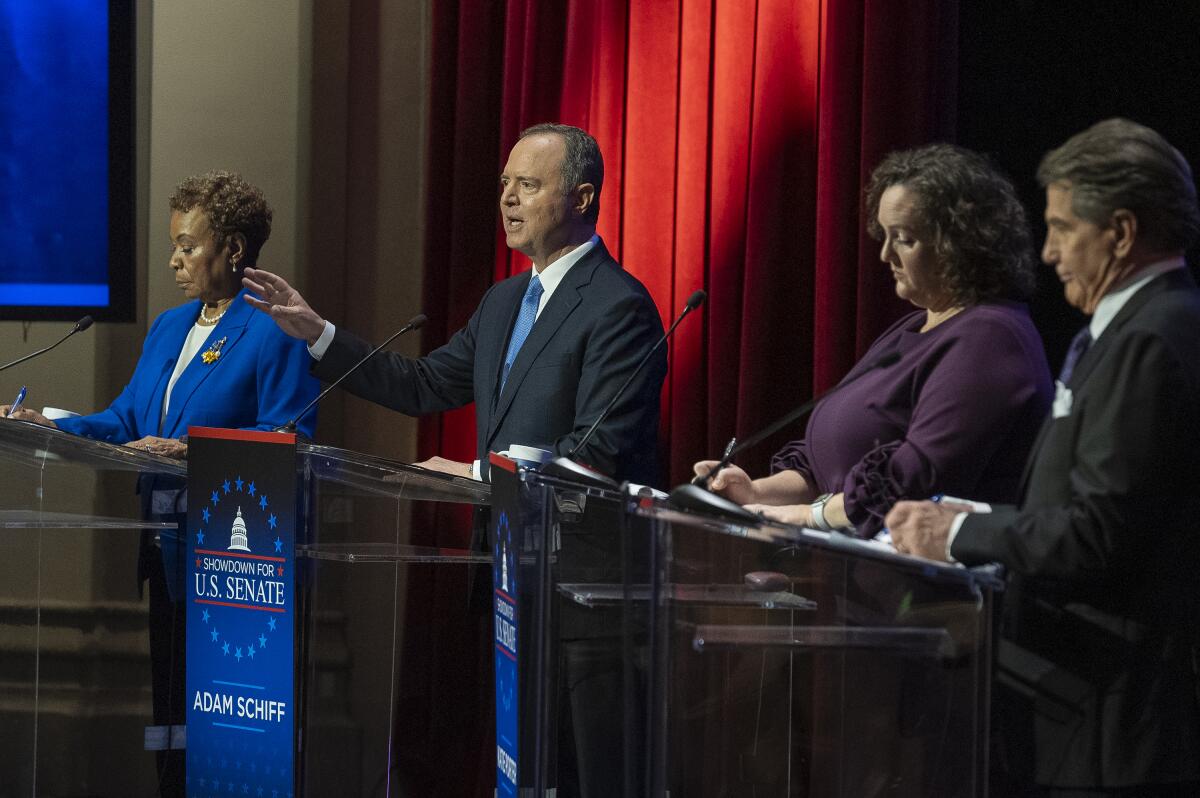
But Lee’s decision to run in spite of these challenges is what she said inspired many of the people she met on the campaign trail — including numerous Black women who were putting together fledgling campaigns to run for office.
They would swap stories about the hardships ahead. The racism and sexism embedded in the system.
“So many of them would come up and whisper to me, ‘I know what the deal is.’ It’s a common conversation Black women have,” Lee told me. “When you step out and do something that others didn’t think you should do as a Black woman, then you get a lot of pushback.”
I saw it too. At her campaign events in cities and counties where she’d never before had a reason to spend much time, Black women and people of color would hang on Lee’s every word:
How she summoned the courage to travel to Mexcio to get an abortion as a teenager. How she worked with the Black Panthers. How, as a member of Congress, she was among the first to call for a permanent cease-fire in Gaza and the only one to resist war after 9/11.
Before running for Senate, Lee was an unknown to many. Now she’s an underappreciated hero with a cult-like following.
Rep. Barbara Lee, an Oakland Democrat, stood alone in voting against the war in Afghanistan in 2001, but the coalition she helped build ultimately brought it to an end 20 years later.
Therefore, I agree with Weber when she says that Lee’s loss in the primary doesn’t diminish the fight for representation that started with the “Keep the Seat” campaign. Or even the push to get Harris elected to the Senate in the first place.
“Nobody’s saying we shouldn’t do this again. Nobody seems to be saying, ‘Well, we lost our chance. We missed our shot,’” Weber said. “But a lot of women that I’ve talked to more recently have said, ‘You know, when this is over, we’ve got to organize.’”
Raising money will always been an issue. So will racism and sexism. But in the end, the campaign for Senate might have been more important than the election. And, in that way, it’s Lee who is getting the last laugh.
More to Read
Sign up for Essential California
The most important California stories and recommendations in your inbox every morning.
You may occasionally receive promotional content from the Los Angeles Times.

